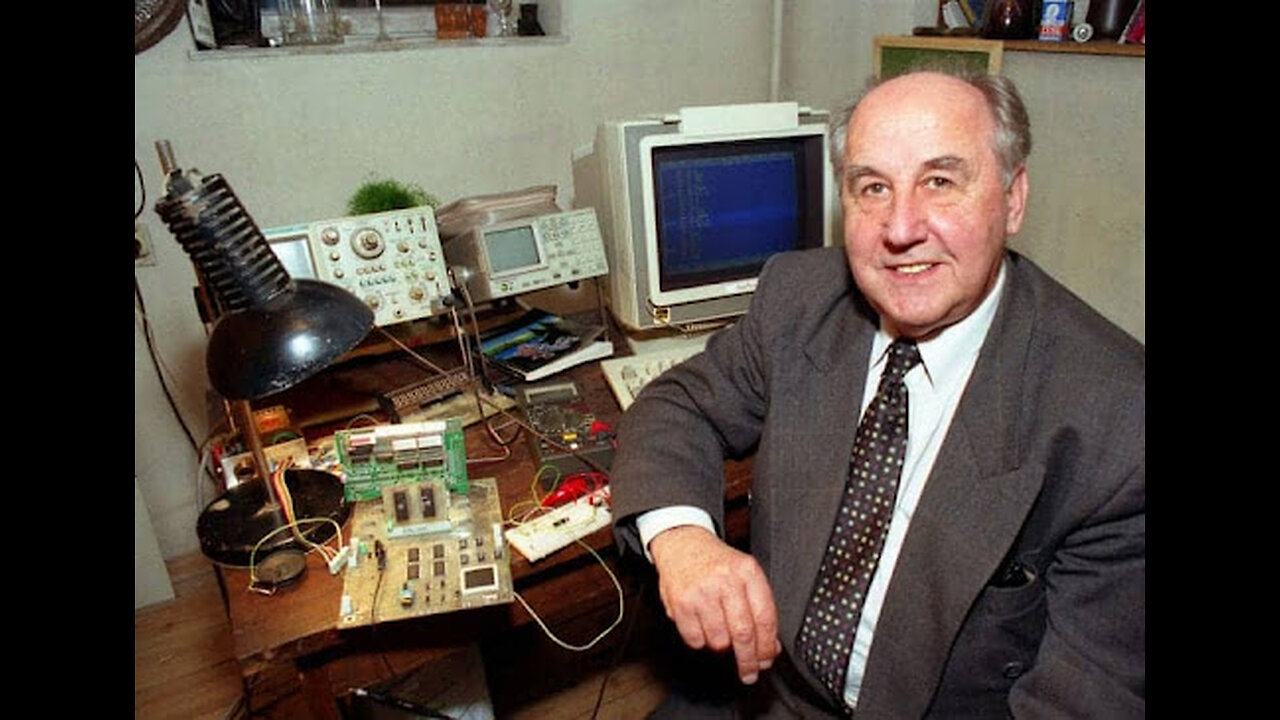Premium Only Content

Polish Genius : Jacek Karpinski
Jacek-Karpinski-Polish-Bill-Gates-and-Steven-Jobs-Computer-K-202-Mini-Computer-First-Computer-in-the-World-3-768×547-1 / Passion, special sensitivity and steadfastness were in Jacek Karpiński's genes - his father, Adam Karpiński, a mountain climbing enthusiast and Himalayan mountaineer, and his mother - Wanda Karpińska, a doctor and lover of ski trails. The parents wanted their unique son to be born on Mont Blanc, but ultimately Jacek was born in a hospital in Turin in 1927. If it were not for the circumstances, he could have become the Polish Steve Jobs, but instead, he died in oblivion in 2010. Learn the story of the Polish genius whose ideas overtook the Americans.
The youth of engineer Karpiński - what shaped the mind of the teenage genius?
The first manifestations of technical genius - a shortwave transmitter and a machine for long-term weather modeling
An American chance for success - he could have been Steve Jobs, but he became Jan Kowalski, or the story of toxic attachment to the homeland
Karpiński's Magnum Opus – K-202 – a microcomputer that was decades ahead of its solutions
When you fall, you fall from your high horse, or the story of the painful fall of engineer Karpiński / Jacek Karpiński's youth is filled with personal tragedies - even before the outbreak of the war in 1939, Adam Karpiński, his father, suddenly dies during an expedition to the Himalayas. The grieving mother, Wanda, sends young Jacek to the auxiliary service. This is how twelve-year-old Jacek joins the Gray Ranks and joins the famous "Zośka" battalion. During the siege of Warsaw by the German occupier, he serves as an anti-aircraft defense liaison, and then organizes a weapons warehouse and a shooting range in his basement. Jacek Karpiński's first invention is the kW NPK-2 shortwave transmitter, which was used by Polish embassies. Further inventions, completely unsuited to the post-war reality, are AAH - a machine that could be used to create long-term models of numerical weather forecasts and AKAT-1 - the world's first transistor-based differential equation analyzer
Could it be possible to remain indifferent to such achievements of a young genius? There is one answer - this is the moment when young Jacek becomes interested in two completely mutually exclusive circles - international science circles and the Polish communist party. While the Polish Academy of Sciences submits the AKAT project to the UNESCO international competition for young technical talents, the party serving the interests of the USSR is rubbing its hands with joy. The young, talented genius, whose ideas were ahead of many Western scientists, had quite a hard time. He knew that if he wanted to further his studies at foreign universities, he would not be able to do it simply. Jacek Karpiński therefore makes a decision that will ultimately lead to his downfall - he cooperates with the party intelligence of the Polish People's Republic to obtain a pass to go to the United States.
Looking from today's perspective, one can think about the young engineer's decision in two ways - he was aware that cooperation with the security service meant selling Western patents and technologies, on the other hand, could a young man who had just finished his studies be fully aware of the what did he agree to? Was he motivated by the desire to develop, did he see a chance to gain valuable experience abroad, but knew that if he did not agree to the conditions offered by the party, his future would actually be impossible? American Dream and Polish reality
The year is 1961, the young genius goes to the USA as a reward, where he starts cooperation with universities, including: Harvard and MiT. It was there, as he emphasizes in one of his later interviews, that the idea of a microcomputer was born, which I will discuss in a moment. Despite successful cooperation and a developing career overseas, Karpiński returns to Poland, where he first works at the Institute of Automation of the Polish Academy of Sciences, where he constructs a perceptron - the second such machine in the world that recognized the environment using a built-in camera composed of a neural network of two thousand transistors.
Then, Karpiński moves to the Institute of Experimental Physics of the University of Warsaw. There, a scanner for analyzing photographs of elementary particle collisions is being created - KAR-65, which operated at a speed of 100,000 operations per second and was 30 times cheaper than the Odra computers that were twice as slow at that time. It operated until the mid-1980s. Karpiński's magnum opus – the K-202 microcomputer
The K-202 microcomputer is Jacek Karpiński's life's work, which in other circumstances would have made him a millionaire. In the reality of the Polish People's Republic, however, he is losing the fight against the system. K-202 was built in the years 1970-1973. This microcomputer operated at a rate of one million operations per second, which turned out to be much faster than the personal computers that were developed 10 years later. The K-202 used many innovative solutions, such as: memory expansion through page addressing, modular structure, thanks to which it was possible to connect the computer with external cables to the memory component in sets. The microcomputer's central unit could handle 64 modules, and in theory it had as much as 8 MB of memory at its disposal. The production of this computer took place in laboratory conditions, with the support of British IT companies - DataLoop and MB Metals. A total of 30 K-202s were built, half of which, in accordance with the contract, was delivered to Great Britain, and the other part was distributed among state offices and plants in the country. Only one copy came into private hands. In 1971, the Olimpia computer exhibition was organized in London, where the K-202 was the leader - only PDP machines could compete with it. K-202 is Karpiński's magnum opus, but it quickly turns out that it becomes the reason for his downfall as a man of technology. Despite his successes, Karpiński cannot find permanent employment, and institutions hold him accountable for his cooperation with the party. After his departure, colleagues manage to fix the errors of the K-202 and a new improved model is released on the market under the name MERA-400.
What does Karpiński do? He drops everything and goes to the Bieszczady Mountains. Well, maybe not literally, because to Warmia, where he settles on a farm and breeds farm animals. This is his silent protest against the situation he faced from state institutions. He seems to be saying: “Look, I'm a computer genius, working with animals! This is not acceptable!”
Unfortunately, his protests do not change much. He manages to establish cooperation with Kudelski, goes to Switzerland, but even here, despite mutual sympathy, Karpiński does not stay there. In the 1990s, Jacek returns to Poland, where he initially lives with his daughter and her family, and in 2003 he moves to Wrocław and works as an IT advisor to Leszek Balcerowicz. He also tried to implement in the country the production of a pen he invented - Pen Reader, which had built-in software and a scanner that allowed reading text one line at a time. Finally, the year 2010 comes, in which the great genius, Jacek Karpiński, dies alone and in debt, unappreciated in his lifetime. It is true that engineer Karpiński's genius was much ahead of the times in which he lived. If he had been born in America, he would have had many more prospects for a stunning research and academic career and a revolution on the local IT market. Unfortunately, this outstanding genius was born during the interwar crisis, in a country where, with his youth and a spine injury, he paid for the war that engulfed the entire world at that time.
As a young boy, he saw no other opportunity to develop his talent and go abroad than to cooperate with the party, which effectively blocked him from traveling. His youth spent in the "Zośka" battalion taught him that there was no greater value than the country, for which one could even die, so, tempted by attractive offers of an academic career, he returned to Poland every time, repentant, hoping that he would succeed. achieve everything on your own terms. There are many stories like the wasted genius of engineer Jacek Karpiński. Poles often sell patents abroad because they do not believe in their own abilities. The trick is to fight for success on your own terms until the end, because it may turn out that, as in the case of Karpiński, he will have to make many sacrifices.
-
 LIVE
LIVE
Randi Hipper
30 minutes agoVOLATILE WEEKEND AHEAD FOR BITCOIN!
151 watching -
 32:20
32:20
Coin Stories with Natalie Brunell
15 hours agoBitcoin Revolution in Washington: Senator Lummis on U.S. Debt, Gold, Stablecoins & Dollar Dominance
721 -
 2:04:58
2:04:58
Game On!
15 hours ago $3.71 earnedFeel Good Friday! Breaking down the Final 4!
23.6K -
 16:38
16:38
T-SPLY
19 hours agoDemocrats Are At President Trump For "Liberation Day"
80.9K59 -
 1:02:20
1:02:20
TheDozenPodcast
21 hours agoAttempted TERROR attack & visiting Tommy Robinson: Chas Symonds
26.2K7 -
 11:27
11:27
IsaacButterfield
1 day ago $4.45 earnedEngland Is Dangerous
17.9K37 -
 37:33
37:33
The Rich Dad Channel
1 day ago5 Shocking Predictions for 2025 (Best of Rich Dad Radio with Robert Kiyosaki)
23.1K4 -
 10:04
10:04
NinjaGamblers
23 hours ago $0.95 earnedHow The Romanovsky Roulette System Wins 86.48% of the Time!
19.8K6 -
 23:07
23:07
Uncommon Sense In Current Times
18 hours ago $1.30 earnedDefending Your Christianity Without Overcomplicating It (Part 2) | Greg Koukl
32.1K7 -
 5:08
5:08
Gun Owners Of America
19 hours agoDebunking Everytown's False Claims About Us
18.8K2